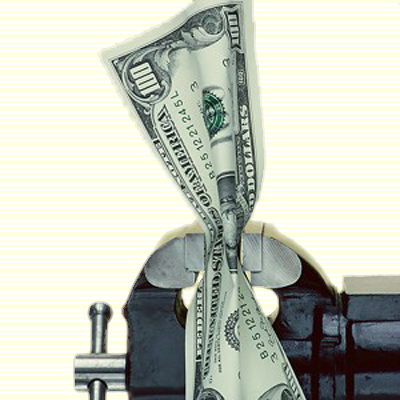(Editors Note: One of the perks of editing "the Bear" allows me to post my own rants. I originally published Better to Light a Candle than to Curse the Darkness in August, 2003. When I consider the effect that energy requirements have on humanity, the fact that global energy resources are mostly under the control of the "Dark Side", and, therefore, not under my control, or yours. I get a little worried. - JSB)
 For the last seven years, I have spent almost all of my time trying to get a handle on the "big picture". The "little pictures" are made up of effects, and sometimes causes, but rarely motives. Its funny how all the "little pictures" don't always coalesce into a greater understanding until, all at once, the truth becomes blatantly obvious and undeniable.
For the last seven years, I have spent almost all of my time trying to get a handle on the "big picture". The "little pictures" are made up of effects, and sometimes causes, but rarely motives. Its funny how all the "little pictures" don't always coalesce into a greater understanding until, all at once, the truth becomes blatantly obvious and undeniable.
In my attempt to determine "motives" I needed to ascertain the true meaning of "real wealth". I have come to the conclusion that besides hard assets, (real estate, factories, machinery, equipment, infrastructure, base metals, precious metals, natural resources, etc.), the only other source of "Real Wealth" comes as a result of human toil.
"Soft assets" are paper, and are the products of contrivances. These instruments have no intrinsic value and are therefore inferior to "hard assets". Whoever has the power to print the money ultimately has control over the value of all "soft assets".
My research has led me to three major issues. First, the nature of America's money supply. Second, the importance and availability of hydrocarbon resources. And thirdly, the importance and availability of fresh water.
How these three issues interrelate exposes the motives and the true nature of "the Game".
"The Game"
Let's say we have two "teams". The first team, (we'll call this team "the Dark Side"), is very well funded, managed, and extremely well trained. The coaching staff is privy to the best analysis and intelligence, has adopted a time tested strategy and is relentless in its desire to win. The second team, (we'll call this one "the Force"), does not even realize its a team. I'm talking, of course, of the "the Dark Side" as made up of the Elitists, (i.e., New World Order, Collectivists, Globalists, Banking Cartel, Fabians, the Illuminati, etc.). Everybody else is on "the Force". If you are not positive you are a member of the former, then you are undoubtedly playing for the latter.
The presence of two teams would suggest a game is in progress. The game started many years ago, and this one's for all "the marbles". I believe that the game plan provides that "the Force" will work itself to death.
"The Marbles"
All new money is loaned into circulation as an interest bearing debt. Since this system only creates the principal and never the interest, the debt is always greater than the money supply.
This fraudulently created debt forces American citizens to borrow constantly so the system can function. Eventually, the process becomes unworkable as society, mortgaged to the hilt, can no longer afford to borrow. This debt creates extreme stress for us as we struggle to meet impossible money obligations. The results are: a constantly rising cost-of-living, layoffs, bankruptcies, family breakdown, increased drug and alcohol use, an increase in crime and a general moral breakdown.
This system is part of the "Grand Strategy" that has allowed "the Dark Side" to gain a choke hold on the very survival of "the Force".
How did we let "the Dark Side" put themselves in a position of control over everything that lends to human survival? The indebtedness of "the Force" has insured a placated opponent.
What do I mean by everything? It seems that all the marbles fall into three categories. Hard Assets, Energy and Water. In order to gain control over all the marbles, part one of the "Grand Strategy" had to be implemented.
After the initial forming of "the Dark Side", the coaching staff had to insure the winning of the coin toss. They did this by the enactment of the Federal Reserve Act of 1913.
"We will receive"
"History reveals nations can be conquered by the use of one or more of three methods.
"The most common is conquest by war. In time, though, this method usually fails, because the captives hate the captors and rise up and drive them out if they can. Much force is needed to maintain control, making it expensive for the conquering nation."
"A second method is by religion, where men are convinced they must give their captors part of their earnings as "obedience to God." Such a captivity is vulnerable to philosophical exposure or by overthrow by armed force, since religion by its nature lacks military force to regain control, once its captives become disillusioned."
"The third method can be called economic conquest. It takes place when nations are placed under "tribute" without the use of visible force or coercion, so that the victims do not realize they have been conquered. "Tribute" is collected from them in the form of "legal" debts and taxes, and they believe they are paying it for their own good, for the good of others, or to protect all from some enemy. Their captors become their "benefactors" and "protectors".
"Although this is the slowest to impose. It is often quite long lasting, as the captives do not see any military force arrayed against them, their religion is left more or less intact, they have freedom to speak and travel, and they participate in "elections" for their rulers. Without realizing it, they are conquered, and the instruments of their own society are used to transfer their wealth to their captors and make the conquest complete."
"Today, as we stand before the dawn of a New World Order run by internationalist financiers, most of the revenue collected by the Federal government in the form of individual income taxes will go straight to paying the interest on the debt alone. At the rate the debt is increasing, eventually we'll reach a point where, even if the government takes every penny of its citizens' income via taxation, it will still not collect enough to keep up with the interest payments. The government will own nothing, the people will own nothing, and the banks will own everything. The New World Order will foreclose on America." - Taken from Sheldon Emery's "Billions for the Bankers, Debts for the People".
Because "the Dark Side" can create money out of thin air, they obviously do not consider it valuable. What is valuable to them is the human toil required to service the debt.
An example of the fraudulent nature of the "Grand Strategy" is the U.S. Government's bailout of Brazil a couple of years ago. The U. S. Government loaned the Brazilian Government $30 billion, with the condition that loan and the interest on the loan be paid by the people of Brazil via taxation. The U.S. Government borrowed the money to loan to Brazil from the Federal Reserve for which the loan and the interest are guaranteed by the American people. Neither of the two afore mentioned loans, for the exact same $30 billion, will ever be paid, but the double debt service will go on forever. Two country's citizenry are being forced to pay interest on the same funny money!
This is equally true for all of our foreign aid to other countries, bailouts of criminally operated corporations, and all of the $billions spent in pursuit of imperial hegemony.
This is not, however, a localized game. The stakes are huge and it is being played out all over the world. "the Dark Side" is financing the sale of "guns to the Arabs and dynamite to the Jews", as they have been on both sides of every war for hundreds of years.
The Second Quarter; Field Position
The probability that oil production on our planet has already peaked carries with it a death sentence for millions, maybe even billions of people within a single generation from now.
When we explore the economic effects of ever rising oil costs on transportation, electricity, economic growth and contraction, political power, civilization and – perhaps most importantly – food production. The picture is horrific, the ramifications being the end of the industrial age.
The "Dark Side" already controls the remaining hydrocarbon deposits of the earth.
In 1859, upon the introduction of petrol extraction technology, the world started running out of oil. There is only so much of it, and we have now reached a point where more than half of it has been used up.
What most people do not realize is that 60% of all hydrocarbon resources have be applied to food production. Through the use of petrochemical fertilizers, pesticides, herbicides, diesel fuel for tractors and harvesters, gasoline for farm-to-market transport, gas generated electricity for refrigeration, plastics for packaging and storage, the lion's share of this resource has been used for food production.
Here's the rub. Through the application of the world's petro-resources in this manner, "the Dark Side" has enriched itself by artificially creating a market to sell to.
Oil based agriculture is primarily responsible for the world's population exploding from 1 billion at the middle of the 19th century to 6.3 billion at the turn of the 21st. As oil production went up, so did food production. As food production went up, so did the population. As the population went up, the demand for food went up, which increased the demand for oil. The price of food will now skyrocket because of the cost of fertilizer will soar. The cost of storing (electricity) and transporting (gasoline) the food that is produced will also soar.
In order for the planet to continue to support humanity, it's numbers will have to be reduced dramatically. Because of the misinformation campaign that was launched in the first quarter of the game, "the Force" is way out of position. As I stated earlier, most don't even know there's a game going on, much less that they're playing.
I foresee many lives being snuffed out within the next two decades as a result of the inability to afford food, (starvation), or through the involvement in the dozens of disputes that will arise over allocation of the world's remaining hydrocarbon resources, (war). Remember, "the Dark Side" is on both sides of all wars. Population contraction is absolutely essential to the planet's ability to support human life.
The Third Quarter; a Battle of Attrition
In 1998, the World Bank refused to guarantee a $25 million loan to refinance water services in Cochabamba, Bolivia, unless the government sold the public water system to the private sector and passed the costs on to consumers. Bolivia, one of the poorest countries in the world, finally acquiesced. Only one bid was considered, and the company was turned over to Aguas del Tunari, a subsidiary of a conglomerate led by Bechtel, the giant San Francisco engineering and construction company.
In December 1999, before making any infrastructure investments, the private water company, Aguas del Tunari, announced the doubling of water prices. For most Bolivians, this meant that water would now cost more than food; for those on minimum wage or unemployed, water bills suddenly accounted for close to half their monthly budgets, and for many, water was shut off completely.
To add to the problem, the Bolivian government, prompted by the World Bank, granted absolute monopolies to private water concessionaires, announced its support for full-cost water pricing, pegged the cost of water to the American dollar and declared that none of the World Bank loan could be used to subsidize water services for the poor. All water, even from community wells, required permits to access, and even peasants and small farmers had to buy permits to gather rainwater on their property.
The selling-off of public enterprises such as transportation, electrical utilities and education to foreign corporations has been a heated economic debate in Bolivia. But this was different; polls showed that 90 percent of the public wanted Bechtel out. Debate turned to protest and one of the world's first "water wars" was launched.
The people of Bolivia revolted against the government over the privatization of water. A broad-based movement of workers, peasants, farmers and others created the Coalition in Defense of Water and Life to "de-privatize" the local water system. Between January and early February, 2000, hundreds of thousands of Bolivians marched to Cochabamba in a showdown with the government, and a general strike and transportation stoppage brought the city to a standstill. Police reacted with violence and arrests and the army killed six people and injured more than 100 when it opened fire on demonstrators. In early April 2000, the government declared martial law.
Could this happen here? Is it possible that you could someday be charged for collecting rainwater off your roof? You would be surprised at how many trans-national companies already have stakes in water delivery in this country.
Globally, we have already entered water scarcity. The Middle East will run out of fresh water within the next ten years. Sub-Saharan Africa will run out in the next 5 years. China is considering moving the capital to another location because there is no more water in Beijing.
Closer to home, the mighty Colorado river no longer makes it to the Sea of Cortez. It trickles out somewhere in the Mexican desert south of the Arizona border. The Rio Grand, which use to flow into the Gulf of Mexico now stops some 20 miles short of Brownsville, Texas. Aquifers all over the country are being depleted far more rapidly than they can recharge themselves. We are on the verge of a national water crisis right here in America.
In the next two decades, the struggle for water will tear apart communities, exacerbate differences between social classes, and challenge governments and private organizations to change how they perceive their roles.
The Forth Quarter; an End Run
According to the World Trade Organization, "human needs can be supplied by private entrepreneurs for a profit, unlike a human right which accrues equally to everyone." National and international trade associations like the WTO and NAFTA define water as a "commodity" and have agreements requiring governments to permit water exports under specified conditions.
Commodification and privatization go hand in hand. Even though the evidence for water scarcity is overwhelming, governments and global bureaucracies, influenced by lobbyists, and, in many documented cases, outright bribery, are disposed to call water a commodity, to transfer what remains to private corporations, and to let the market determine who gets water and the price they pay for it.
The commodification of water, internationally, is on the horizon. The day will come when no one will be able to collect it without a permit. Many persons throughout the world will be prosecuted for its illegal possession.
It will happen here.
End Game
I guess it all boils down to human nature. There are and always will be the haves and the have nots. In their insatiable quest for profits, "the Dark Side", using their agents in trans-national corporations, the World Trade Organization and the World Bank, have successfully brought us to the brink of the abyss. Knowing full well the gravity of the situation and the only solution, they are now poised to solve the problem. There are far too many people on the planet. The time has come for contraction.
The world is no longer capable of economic expansion. We are entering a period of civilization where the keyword is sustainability, not growth.
Sustainability is job one. In order to incite the massive contraction that is desperately needed, economics will be used as a weapon. It is the weapon of choice when it comes to survival. The possession of Hard Assets, Energy and Fresh Water will rule the day.
What purpose would a revolution serve. Who among us has a solution?
In a world of $100/barrel oil, the weak die and the strong survive. In a world of $100/barrel water, there will not be 6.5 billion people on the earth. Actually I expect the number to be more in the 500 million range.
Very soon, as early as next year, a lot of people here will be glad they held gold and silver.
Get some control over some fresh water immediately.
 Its not what you don't know that will screw you up, it's what you know that is wrong. The spin you hear from the mainstream media is intended to mislead you. Open your eyes and face the future. If you leave your head in the sand and ignore it, you are only leaving your butt exposed for the world to kick. This all may sound like gloom and doom, but when you get a handle on what is going to happen, you will have a future filled with opportunity. Fortune favors the Informed.
Its not what you don't know that will screw you up, it's what you know that is wrong. The spin you hear from the mainstream media is intended to mislead you. Open your eyes and face the future. If you leave your head in the sand and ignore it, you are only leaving your butt exposed for the world to kick. This all may sound like gloom and doom, but when you get a handle on what is going to happen, you will have a future filled with opportunity. Fortune favors the Informed.
For my follow up essay on "the Big Picture" please see "One if by Land..."
 Kenneth Parsons, aka Johnny Silver Bear, is an IT professional in Texas and the President of Silver Bear Communications, Inc. Mr. Parsons has been involved in the advertising and promotion industry for over twenty-five years. He is the editor of the Silver Bear Cafe and, as such, is responsible for shaping the content of "The Bear". Mr. Parsons has served as CEO for Fiberscape Communications, Inc., a web site development / hosting and streaming multi-media company in Richardson, Texas since 1997. He is a Jeffersonian and a passionate supporter of the U.S. Constitution. He is also an outspoken advocate of gold money and equal tax rates. You can contact Mr. Parsons with questions or comments via email at johnny@silverbearcafe.com
Kenneth Parsons, aka Johnny Silver Bear, is an IT professional in Texas and the President of Silver Bear Communications, Inc. Mr. Parsons has been involved in the advertising and promotion industry for over twenty-five years. He is the editor of the Silver Bear Cafe and, as such, is responsible for shaping the content of "The Bear". Mr. Parsons has served as CEO for Fiberscape Communications, Inc., a web site development / hosting and streaming multi-media company in Richardson, Texas since 1997. He is a Jeffersonian and a passionate supporter of the U.S. Constitution. He is also an outspoken advocate of gold money and equal tax rates. You can contact Mr. Parsons with questions or comments via email at johnny@silverbearcafe.com
 L’ennesimo caso di fuga di cervelli italiana regala al mondo una nuova speranza per la lotta contro il cancro: Pier Paolo Pandolfi, scienziato di fama mondiale che da anni lavora all’estero ha capito come far invecchiare i tumori, disattivando un gene chiamato Skp2 che è presente in modo anomalo in molti tipi di cancro. Spegnendolo si attiva il processo di senescenza cellulare e le cellule malate smettono di proliferare e muoiono. I risultati della ricerca che è stata portata avanti da un un team di ricercatori internazionali, fra cui anche l’italiano Pandolfi dell’Harvard Medical School di Boston , e Manuel Serrano dello Spanish National Cancer Research Center di Madrid, sono stati pubblicati su Nature.
L’ennesimo caso di fuga di cervelli italiana regala al mondo una nuova speranza per la lotta contro il cancro: Pier Paolo Pandolfi, scienziato di fama mondiale che da anni lavora all’estero ha capito come far invecchiare i tumori, disattivando un gene chiamato Skp2 che è presente in modo anomalo in molti tipi di cancro. Spegnendolo si attiva il processo di senescenza cellulare e le cellule malate smettono di proliferare e muoiono. I risultati della ricerca che è stata portata avanti da un un team di ricercatori internazionali, fra cui anche l’italiano Pandolfi dell’Harvard Medical School di Boston , e Manuel Serrano dello Spanish National Cancer Research Center di Madrid, sono stati pubblicati su Nature.


 (4 voti, media: 4.75 su 5)
(4 voti, media: 4.75 su 5)
 In the 20th century, Detroit, Michigan, symbolized American industrial might. Today it symbolizes the offshored economy.
In the 20th century, Detroit, Michigan, symbolized American industrial might. Today it symbolizes the offshored economy. 
 The U.S. government this week reported a record monthly budget deficit for February 2010 of $220.9 billion. Total tax receipts for the month were only $107.5 billion compared to outlays of $328.4 billion. The total U.S. deficit for the first five months of fiscal year 2010 was $651.6 billion, with tax receipts of $800.5 billion and outlays of $1.45 trillion. The deficit was up 10.5% for the first five months of fiscal year 2010 over the same period in fiscal year 2009.
We are now at a point where if the U.S. government taxed Americans 100% of their income, the tax receipts generated would not be enough to balance the budget. Likewise, if the U.S. government cut 100% of its spending including defense, but kept paying Social Security, Medicare and Medicaid, we would still have a budget deficit. NIA believes it will be impossible for the U.S. to have a balanced budget ever again.
The U.S. national debt is now $12.55 trillion of which $8.061 trillion is public debt. Due to the Federal Reserve's artificially low interest rates of 0% to 0.25%, interest payments on our national debt last month were only $16.9 billion, an interest rate of only 2.548% on our public debt. The reason for the spread between our 2.548% interest rate on the public debt and the federal funds rate of 0 to 0.25% is that a portion of our national debt is made up of long-term bonds at higher interest rates.
Our debt ceiling was recently raised to $14.3 trillion, which we are on track to reach in less than a year, sending our public debt up to about $10 trillion. If the Federal Reserve raises the federal funds rate up to just 2% during the next year, NIA believes the interest rate on our public debt could rise to 5% and our annual interest payments will likely rise to $500 million or 23% of projected 2010 tax receipts of $2.165 trillion.
The White House is not projecting for interest payments on the national debt to break the $500 million mark until fiscal year 2014. By then, even if we go by White House projections that the deficit will be cut to $828 billion in 2012, $727 billion in 2013 and $706 billion in 2014, in 2014 we will still be looking at a national debt of over $18.5 trillion with a public portion of around $13.14 trillion. We find it shocking that the White House is projecting an interest rate on our public debt in 2014 of only around 4%.
All of this means that the While House expects the Federal Reserve to leave interest rates at artificially low levels almost indefinitely. However, we know it will be impossible for them to do so without creating a huge outbreak of inflation in the prices of food, energy, clothing, and just about everything else Americans need to live and survive. In order to prevent hyperinflation, we need interest rates to be higher than the rate of inflation.
NIA believes the real rate of U.S. inflation to already be approximately 5%. If the Federal Reserve doesn't raise the federal funds rate to above 5% in the short-term, in our opinion, an outbreak of double-digit inflation is inevitable. By 2014, it is possible the Federal Reserve will be forced to raise the federal funds rate up to above 10% and the public portion of our national debt could exceed $15 trillion. Therefore, in 2014 we could see the interest payments on our national debt reach $1.5 trillion, about triple what is currently being projected and 43% of the government's projected tax receipts that year of $3.455 trillion.
NIA believes hyperinflation is possible by the year 2015. Besides the rising interest payments on our national debt, another major catalyst for hyperinflation will be social security payments, which adjust to the CPI-index. As the government's CPI-index rises, so will the social security payments that it owes. This could cause a death-spiral in the U.S. dollar. Inflation is still the last thing on the minds of most Americans, but soon it will be their primary concern.
Please spread the word about NIA and have your friends and family subscribe for free.
The U.S. government this week reported a record monthly budget deficit for February 2010 of $220.9 billion. Total tax receipts for the month were only $107.5 billion compared to outlays of $328.4 billion. The total U.S. deficit for the first five months of fiscal year 2010 was $651.6 billion, with tax receipts of $800.5 billion and outlays of $1.45 trillion. The deficit was up 10.5% for the first five months of fiscal year 2010 over the same period in fiscal year 2009.
We are now at a point where if the U.S. government taxed Americans 100% of their income, the tax receipts generated would not be enough to balance the budget. Likewise, if the U.S. government cut 100% of its spending including defense, but kept paying Social Security, Medicare and Medicaid, we would still have a budget deficit. NIA believes it will be impossible for the U.S. to have a balanced budget ever again.
The U.S. national debt is now $12.55 trillion of which $8.061 trillion is public debt. Due to the Federal Reserve's artificially low interest rates of 0% to 0.25%, interest payments on our national debt last month were only $16.9 billion, an interest rate of only 2.548% on our public debt. The reason for the spread between our 2.548% interest rate on the public debt and the federal funds rate of 0 to 0.25% is that a portion of our national debt is made up of long-term bonds at higher interest rates.
Our debt ceiling was recently raised to $14.3 trillion, which we are on track to reach in less than a year, sending our public debt up to about $10 trillion. If the Federal Reserve raises the federal funds rate up to just 2% during the next year, NIA believes the interest rate on our public debt could rise to 5% and our annual interest payments will likely rise to $500 million or 23% of projected 2010 tax receipts of $2.165 trillion.
The White House is not projecting for interest payments on the national debt to break the $500 million mark until fiscal year 2014. By then, even if we go by White House projections that the deficit will be cut to $828 billion in 2012, $727 billion in 2013 and $706 billion in 2014, in 2014 we will still be looking at a national debt of over $18.5 trillion with a public portion of around $13.14 trillion. We find it shocking that the White House is projecting an interest rate on our public debt in 2014 of only around 4%.
All of this means that the While House expects the Federal Reserve to leave interest rates at artificially low levels almost indefinitely. However, we know it will be impossible for them to do so without creating a huge outbreak of inflation in the prices of food, energy, clothing, and just about everything else Americans need to live and survive. In order to prevent hyperinflation, we need interest rates to be higher than the rate of inflation.
NIA believes the real rate of U.S. inflation to already be approximately 5%. If the Federal Reserve doesn't raise the federal funds rate to above 5% in the short-term, in our opinion, an outbreak of double-digit inflation is inevitable. By 2014, it is possible the Federal Reserve will be forced to raise the federal funds rate up to above 10% and the public portion of our national debt could exceed $15 trillion. Therefore, in 2014 we could see the interest payments on our national debt reach $1.5 trillion, about triple what is currently being projected and 43% of the government's projected tax receipts that year of $3.455 trillion.
NIA believes hyperinflation is possible by the year 2015. Besides the rising interest payments on our national debt, another major catalyst for hyperinflation will be social security payments, which adjust to the CPI-index. As the government's CPI-index rises, so will the social security payments that it owes. This could cause a death-spiral in the U.S. dollar. Inflation is still the last thing on the minds of most Americans, but soon it will be their primary concern.
Please spread the word about NIA and have your friends and family subscribe for free. For the last seven years, I have spent almost all of my time trying to get a handle on the "big picture". The "little pictures" are made up of effects, and sometimes causes, but rarely motives. Its funny how all the "little pictures" don't always coalesce into a greater understanding until, all at once, the truth becomes blatantly obvious and undeniable.
For the last seven years, I have spent almost all of my time trying to get a handle on the "big picture". The "little pictures" are made up of effects, and sometimes causes, but rarely motives. Its funny how all the "little pictures" don't always coalesce into a greater understanding until, all at once, the truth becomes blatantly obvious and undeniable. Its not what you don't know that will screw you up, it's what you know that is wrong. The spin you hear from the mainstream media is intended to mislead you. Open your eyes and face the future. If you leave your head in the sand and ignore it, you are only leaving your butt exposed for the world to kick. This all may sound like gloom and doom, but when you get a handle on what is going to happen, you will have a future filled with opportunity. Fortune favors the Informed.
Its not what you don't know that will screw you up, it's what you know that is wrong. The spin you hear from the mainstream media is intended to mislead you. Open your eyes and face the future. If you leave your head in the sand and ignore it, you are only leaving your butt exposed for the world to kick. This all may sound like gloom and doom, but when you get a handle on what is going to happen, you will have a future filled with opportunity. Fortune favors the Informed.
